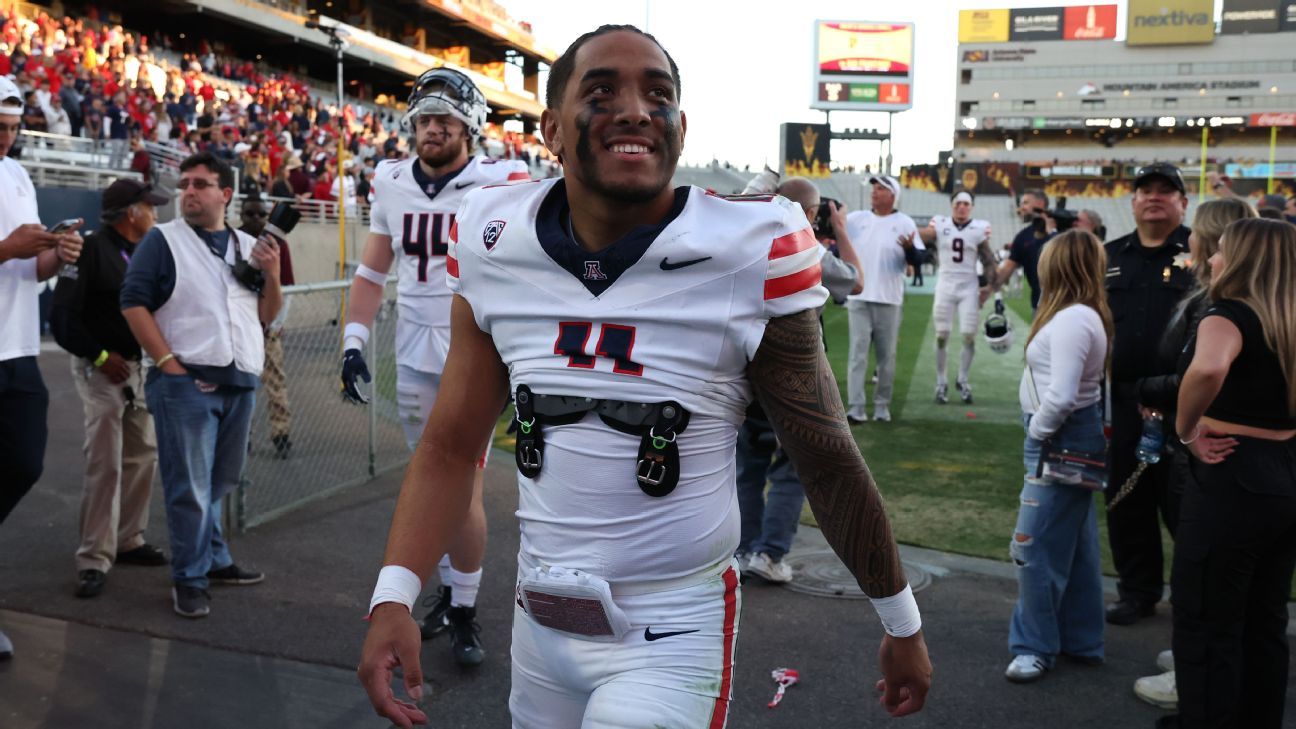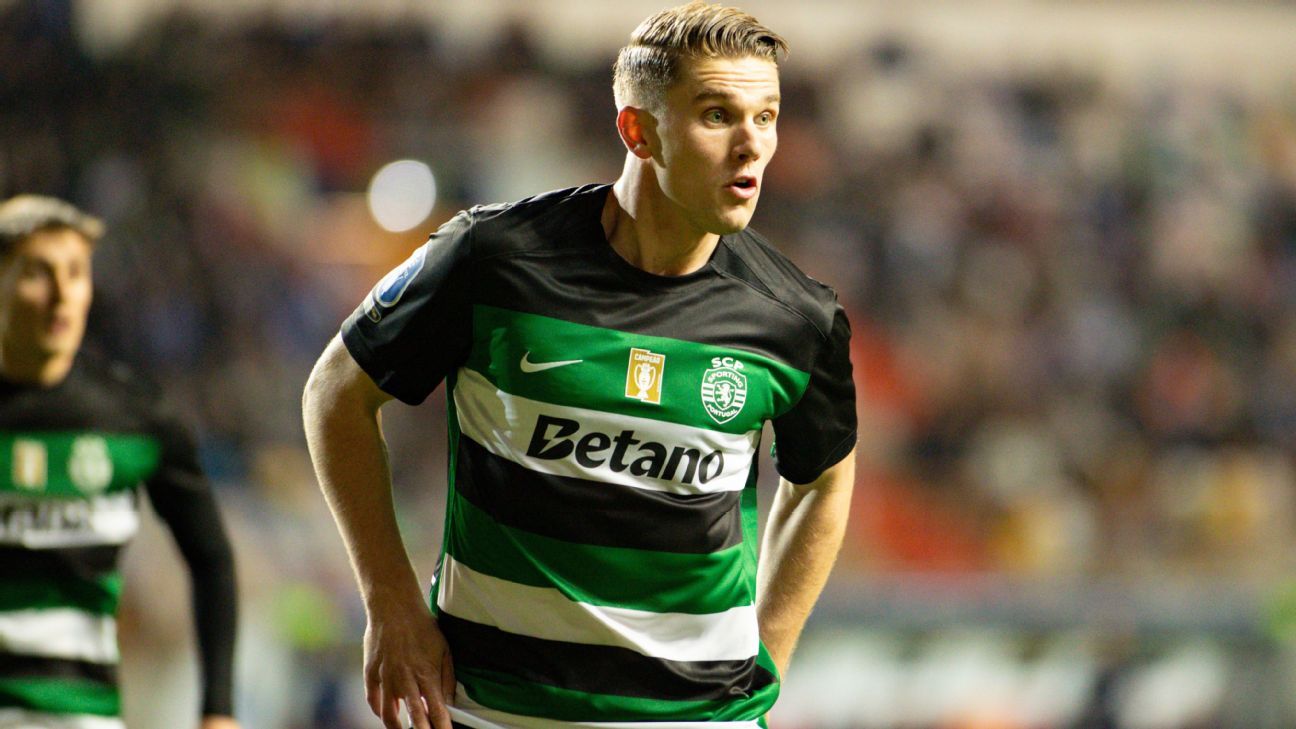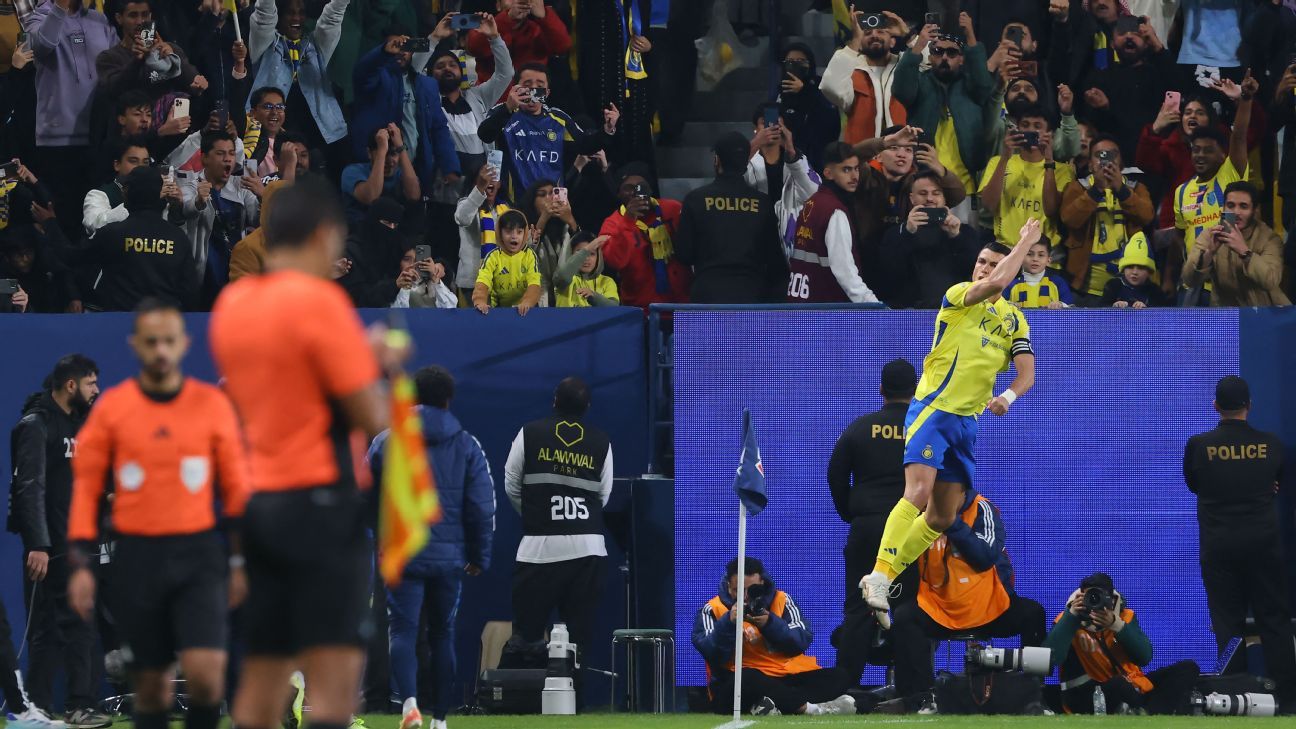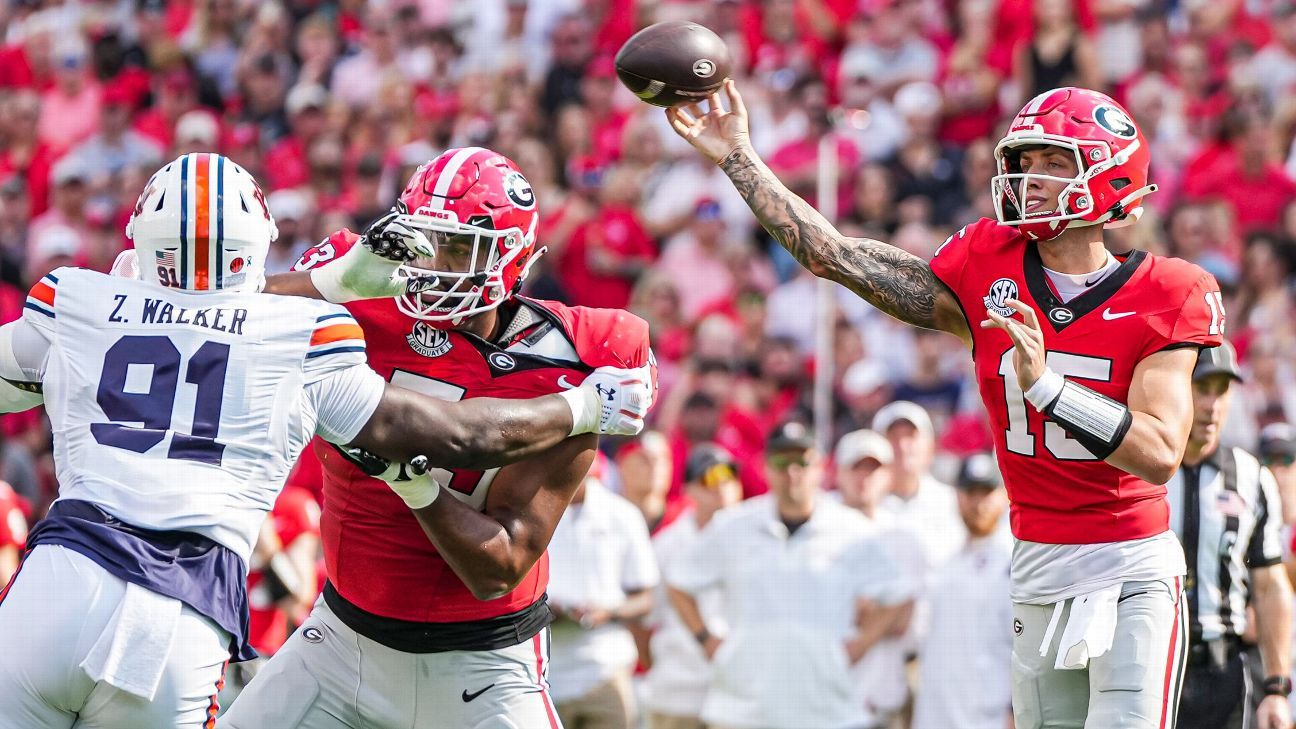TUCSON, Arizona — Arizona quarterback Noah Fifita left the Sonoran Desert on cloud nine.
After starting the 2023 season as the backup, the Southern California native led the Wildcats to one of their best seasons in school history. They finished the season with seven straight wins, capped with a convincing, 38-24 win against Oklahoma in the Valero Alamo Bowl. Arizona would finish No. 11 in the final AP poll — tied for its third-best finish ever — and only national-champion Michigan entered the offseason with a longer unbeaten streak.
Returning home should have provided Fifita an opportunity to catch his breath after a surreal rise to breakout star, but his brain forced him to believe that being away from campus meant less time to prepare for the following season. With most of the team’s key players set to return in 2024, there was a shared sense that something special was soon to come.
“I couldn’t wait to get back to Tucson and get to work,” Fifita said. “We had College Football Playoff, national championship aspirations.”
The buzz was palpable when the team reconvened Jan. 8, and for nearly a week — with the newcomers in the mix — workouts were conducted with purpose.
The honeymoon was short-lived. On Jan. 13, rumors that Arizona coach Jedd Fisch would depart for Washington picked up steam. Strangers started hitting up Fifita on social media, “Are you going to Washington?” His following on Instagram swelled with Washington fans and even some players.
“I was so confused,” Fifita said.
He was set to coach a youth football team and get a haircut the following morning, after which he and receiver Tetairoa McMillan — one of his best friends and a teammate since middle school — were planning to head to Fisch’s house for clarification. Sitting in the barber’s chair, though, the alert came through on Fifita’s phone: Fisch had accepted the Washington job.
A short while later, the players received word of a team meeting for 6 p.m., at which Fisch spoke to them for the last time. It was quick and to the point. Such is the business of college football. And it left Fifita in a haze.
“The next morning my mom called me; she said, ‘I’m on the plane,'” Fifita said. “And I was like, ‘Where are you going?’ She’s like, ‘I’m coming to Tucson; can you pick me up?'”
Momentarily confused, Fifita asked his mom why she was coming to Tucson.
“Just to be with you,” she said.
“She’s kind of what got me through the week, but I didn’t sleep good that week,” Fifita said. “My mind went everywhere.”
Over the next few days, Fifita played out the various scenarios in his head. He discussed them with family, friends and teammates: “Go to Washington. Stay at Arizona. Go somewhere else.”
His natural inclination was that he wanted to stay. It was the same for the others.
“It would have been easy for us to just pick up and leave and go to Washington and follow them — same coaching staff, same offense, same players, because I assume if we all left then everybody else would follow,” McMillan said. “But it’s like, man, for us it was like we’ve already started something over here. We’re trying to not only be loyal to the community, to Arizona, to Tucson, but just continue our legacy that we started over here.”
San José State coach Brent Brennan was hired just 48 hours after Fisch’s departure, and within days, Arizona’s core group — led by Fifita and McMillan — had seen enough. Inside a packed McHale Center during a basketball game against UCLA on Jan. 20, a large group of players went on the floor to inform the crowd they were ready to run it back.
Seven months later, Fifita’s mindset is in the same place it was in late December, ready to make a run at the Big 12 title and potentially more.
“That hasn’t wavered, and that’s the goal,” he said. “That’s what we’re trying to do.”
FIFITA AND MCMILLAN were in the eighth grade when they first crossed paths. Fifita’s dad, Les, coached him on a powerhouse youth football team in Orange County and heard through a connection about a talented kid who would be a good add for the team.
There was one issue, however. That kid — McMillan — was used to playing quarterback.
“Obviously, that went out the window as soon as I came on the team with Kolo [the nickname he refers to Fifita by],” McMillan joked. “We kind of clicked from the beginning. All Polynesians have similar culture, so we just got along, and from there, the rest is history.”
A lot of history. At Servite High in Anaheim, which plays in the Trinity League — one of the most competitive high school football leagues in the country — Fifita, though undersized, was named the state’s sophomore and junior of the year. McMillan blossomed into one of the most recruited wide receivers in the country. Two others from the same Pop Warner team — linebacker Jacob Manu, who led the Pac-12 in tackles last year, and tight end Keyan Burnett — also went to Servite before signing as part of the same recruiting class at Arizona with Fifita and McMillan.
At every step, Fifita, who is naturally quiet and unassuming, has been the de facto leader. A cerebral player whose football instincts reflect those of a son of a coach with uncles with college football and NFL acumen.
“I would just say the thing that has always stood out to me was just his IQ, the way he processed and broke down the game,” Burnett said of Fifita in his younger years. “He wasn’t as vocal with it as he is now, but just being around him is something that I could definitely see and feel the way he would break down different looks and just operate.”
There has always been an aura of confidence.
Fifita was the first of the longtime teammates to commit to Arizona. Despite his prolific high school career, Fifita’s size — Arizona lists him, perhaps generously, at 5-foot-10 — scared many teams away. Cal was the only other Power 5 program to offer, which is likely where he would have ended up if Fisch hadn’t gotten in touch just weeks after being hired.
“I committed to Arizona, but I really committed to Coach Fisch and coach Jimmie Dougherty,” Fifita said. “I could kind of see their vision from the get-go.”
Burnett and Manu soon followed, but throughout their senior year McMillan was set on going to Oregon. He changed his mind only after coach Mario Cristobal left for Miami, surprising his friends with the news he was joining them at Arizona two days after the initial December signing day.
From the day McMillan walked on campus, he was one of the best players on the team. In 2022, he ranked first among all true freshmen nationally with 702 receiving yards and led the Pac-12 with eight touchdown catches.
Manu’s path was similar. He quickly became a starter and led all true freshmen nationally with 54 tackles. Burnett’s impact wasn’t as pronounced, but he appeared in nine games in his first year, with one start.
While his friends were thriving, Fifita was waiting. Quarterback Jayden de Laura, the 2021 Pac-12 Offensive Freshman of the Year, was named the starter after transferring from Washington State, and given he had three seasons of eligibility remaining, Fifita did not have a clear path to early playing time.
“I’m not going to lie, it was hard to be patient, but I was blessed to be able to just have a guy [in de Laura] that I learned from that I really respected,” Fifita said.
Fifita appeared in three games as a true freshman, retaining his redshirt, while serving as de Laura’s primary backup. With de Laura running the offense, Arizona took a major step forward in 2022, finishing 5-7 after starting the year having won just one of its previous 24 games. De Laura’s 3,685 passing yards ranked third on Arizona’s single-season list, solidifying his hold on the job. All Fifita could do going into 2023 was stay ready.
He didn’t have to wait long for his first meaningful opportunity. In the Pac-12 opener against Stanford on Sept. 23, de Laura went down near the sideline late in the third quarter, howling in pain. It was clear right away he wouldn’t be able to keep playing. Fifita said his first instinct was to be concerned about de Laura’s well-being, but he quickly shifted gears.
Stanford was leading 17-14 after a long drive ended in a missed field goal, then Fifita took over. He engineered a nine-play, 67-yard touchdown drive to give Arizona a four-point lead. Stanford answered with a field goal, and when Arizona got the ball back, Fifita seamlessly led the offense to a pair of first downs to run out the clock and secure the win.
By this point, his play in practice had already won over a lot of teammates and the coaching staff, but his poise in the moment inspired genuine optimism about how the offense would function with him at the helm.
“I’m sure it surprised others, but man, I’ve been seeing that since we were 14 years old, so it was nothing new,” McMillan said.
De Laura’s injury was set to keep him sidelined for at least a couple of weeks, which meant Fifita’s first two starts would come against No. 7 Washington — the eventual national runner-up — and USC, which was then still ranked in the top 10.
Fifita rose to the occasion. He completed 52 of 74 passes for 535 yards over the two-game span, with eight touchdowns and two interceptions.
But the Wildcats lost both: 31-24 to Washington and 43-41 in triple overtime to USC. Fifita fought back a grimace before shaking his head in disgust when recalling those games.
“I believe I’m the reason we lost both of those games, to be honest. Washington — I mean you’re playing against Michael Penix, who was a Heisman candidate, a top-10 pick. So, to be able to hold him to 31 points, that should be enough to win the game. So I give our defense a lot of credit. He didn’t throw for a touchdown that game. So the offense didn’t do enough to win that game.”
And USC?
“Especially USC. We held Caleb Williams, who was the best player in the draft last year, who was the best player in college football, to 28 points in regulation,” Fifita said. “If you hold Caleb Williams to 28 points and 150 passing yards in four quarters, you got to win the game.”
Said McMillan: “That’s just the person he is. He’s accountable, he’s coachable. He’s willing to take the blame for anybody even though it’s not his fault.”
For three weeks, Fisch maintained publicly that de Laura would remain the starter if he was “100% healthy.” However, after Fifita threw for 342 yards in a 44-6 rout at then-No. 19 Washington State, his tune changed.
“We have two really good ones,” Fisch said the following week before a game with No. 11 Oregon State. “So, we’ll see what that looks like come Saturday.”
It wasn’t exactly spelled out, but Fifita had been promoted to QB1. (De Laura briefly transferred to Texas State after the season, but he withdrew and was not selected after making himself eligible for the NFL draft.)
After taking over, Fifita was among the best quarterbacks in college football by every conceivable metric, finishing with 2,869 passing yards, 25 touchdowns and 6 interceptions. In Pac-12 play, his QBR (85.6) ranked behind only Oregon‘s Bo Nix (92.6) and ahead of the conference’s other two first-round NFL draft picks, Williams (82.8) and Penix (78.4). He threw for almost two more yards per attempt, had six more touchdown passes and was sacked 24 fewer times than Colorado‘s Shedeur Sanders, to whom he’ll likely be compared this year as Colorado is also making the switch to the Big 12 this season.
Had Fifita been entrenched as the starter from Day 1, his numbers — combined with Arizona’s success — would have put him in the Heisman Trophy conversation. This year, he’s among the 20-25 guys some sportsbooks have offered odds on to win the award.
“I’m not an individual award guy, but I would be lying if I said that I didn’t grow up dreaming about the Heisman Trophy,” Fifita said. “I think every little kid dreams about that. So to be in the same sentence, to be in that conversation is a blessing.”
BRENNAN HAS A deep history with Arizona. His brother played for legendary coach Dick Tomey; his wife graduated from Arizona; and he spent a year as a graduate assistant in Tucson under Tomey in 2000.
There are enough ties that have kept him genuinely interested in the Wildcats from afar, as he spent the past two decades coaching at San José State and Oregon State. This past year, due to some fortunate scheduling, he said he caught maybe six or seven of the Wildcats games live.
He was tuned in when de Laura went down against and was enamored with the poise Fifita showed in leading Arizona on the go-ahead and game-sealing drives.
“I told my wife, who went to school here, ‘This kid is unbelievable,'” Brennan said. “And then it just continued through the season. We were watching the triple-overtime game against USC on a plane and I’m just like, ‘This kid is balling.’ Like, he’s fantastic. I was just really impressed with the command — seemed like he always knew where to go with the ball and he threw with great accuracy and anticipation, which — I love that.”
When Brennan interviewed for the job, following a seven-year run at San José State, it was tempting to daydream about what it would be like to coach Fifita. But like anyone else, it was natural for Brennan to wonder if Fifita would follow Fisch to Washington or perhaps transfer somewhere else.
One of the first calls Brennan made after accepting the job was to Troy Thomas, his former roommate at the University of Hawai’i, where they both spent the 1998 season as graduate assistants. Thomas, it just so happened, was the head coach at Servite High, where he coached Fifita, McMillan, Manu and Burnett.
“I said, ‘Hey, tell me about Noah. And he’s like, ‘Dude, you won’t believe it.’ He said he’ll be unlike any player you’ve ever coached.”
Thomas regaled Brennan with stories about how before Fifita’s freshman year, he would get chances in seven-on-seven with the varsity and methodically guided the team on scoring drive after scoring drive. For a kid that age, it was extremely rare. After the call, Thomas got in touch with his former players and their parents to vouch for Brennan’s character.
“Which was obviously helpful because they didn’t know me,” Brennan said. “Here’s another coach who knows me well at least telling them like, ‘Hey, this guy will be a good guy for your kids.'”
In the whirlwind of responsibilities Brennan was tasked with upon arriving in Tucson, it was actually his wife, C that had the first meaningful conversation with Fifita. While Brent met with human resources, Courtney chatted with Fifita outside on a golf cart. When his meeting wrapped, Courtney told him, “Hey, I think you should chat with Noah.”
So, they did. It was somewhat brief — maybe about 30 minutes — but near the end Brennan suggested to Fifita that he round up 20-25 guys and swing by his office the next day to talk about whatever they wanted. The next day, his office was full and for two hours Brennan discussed his coaching style, his philosophy and tried to give them a glimpse into what it would be like to play for him.
“At the end of it I said, ‘Hey, this is cool. You guys wanna do it again tomorrow?” Brennan said. “They said, okay. So, the next day, Noah and T-Mac had the whole room full again.”
It was another constructive conversation, after which Fifita and McMillan hung behind.
“Everybody filed out,” Brennan said, “and T-Mac and Noah shut the door and Noah said, ‘We’re with you.'”
With Fifita and McMillan on board, a mass exodus was averted. There were still some departures, as was inevitable, but the most influential players from one of the best teams in school history were staying.
“If any player had the single most influence of players staying, that’s Noah for sure,” said safety Gunner Maldonado. “Like, by far. Who is to say what would have happened if Noah didn’t stay, you know? Those conversations might have been a little different because he’s a big part of our team.”
Fifita downplayed the idea of his outsized importance in keeping the band together, calling it a “team decision,” but his initial anxiety was put at ease by Brennan’s decidedly chill, West Coast vibe.
“You can see right away the type of guy Coach Brennan is, but maybe you would think that would change because at the end of the day he’s trying to recruit you to stay. But after we decided to stay, he hasn’t changed,” Fifita said. “He’s the same guy to this day. I mean we were walking outside to the indoor [practice facility] and Coach Brennan stopped to pick up trash on the ground. You don’t see a head coach doing that. So that just shows the type of guy he is. Great ball coach, better person.”
Brennan has similar feelings about Fifita. Through the spring, everything he heard from Taylor — and from others — proved to be true. If anything, Brennan said, it’s possible he was undersold just how unique Fifita is to be around.
“He’s literally the best leader I’ve ever been around,” Brennan said. “I’ve never seen anyone like him.”






